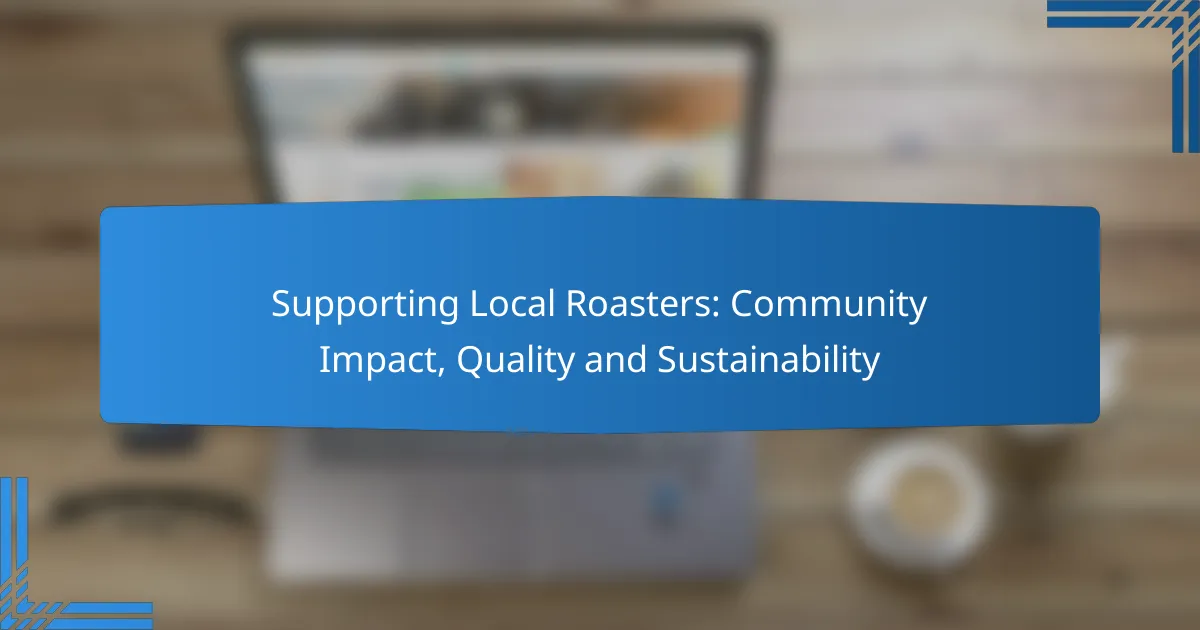Supporting local roasters plays a crucial role in enhancing community well-being by driving economic growth, fostering social ties, and encouraging sustainable practices. By prioritizing freshness and unique flavors, these roasters not only elevate the coffee experience but also promote transparency in sourcing. Their commitment to environmentally friendly operations further contributes to a healthier planet, making every cup of coffee a step towards sustainability.

How Do Local Roasters Impact Communities?
Local roasters significantly impact communities by fostering economic development, enhancing social connections, and promoting sustainable practices. Their presence not only creates jobs but also strengthens local culture and supports regional agriculture.
Economic growth through local jobs
Local roasters contribute to economic growth by creating jobs in various sectors, including production, retail, and distribution. These businesses often employ local residents, which helps keep money circulating within the community.
For instance, a small roastery may hire baristas, roasters, and administrative staff, providing employment opportunities for dozens of individuals. This job creation can lead to increased spending in local shops and services, further boosting the economy.
Community engagement and events
Local roasters often serve as community hubs, hosting events that bring people together. These gatherings can include coffee tastings, workshops, and cultural celebrations, fostering a sense of belonging among residents.
By engaging with the community, local roasters help to build relationships and networks that strengthen social ties. This engagement can also encourage collaboration between different local businesses, enhancing the overall community spirit.
Support for local farmers
Many local roasters prioritize sourcing their coffee beans from nearby farmers, which supports local agriculture and promotes fair trade practices. This direct relationship ensures that farmers receive fair compensation for their products, contributing to their economic stability.
By choosing to buy from local producers, roasters can help sustain regional farming practices and encourage the growth of sustainable agriculture. This not only benefits the farmers but also enhances the quality of the coffee served to consumers.
Promotion of local culture
Local roasters play a vital role in promoting local culture through their unique offerings and community-focused initiatives. They often showcase local art, music, and culinary traditions, creating a vibrant atmosphere that reflects the area’s identity.
By incorporating regional flavors and themes into their products and events, roasters help to celebrate and preserve local heritage. This cultural promotion can attract visitors, further enriching the community’s cultural landscape.
Environmental stewardship initiatives
Many local roasters are committed to environmental stewardship by implementing sustainable practices in their operations. This can include using eco-friendly packaging, reducing waste, and sourcing beans from farms that practice sustainable agriculture.
Additionally, local roasters may engage in community initiatives such as tree planting or recycling programs, encouraging customers to participate in environmental efforts. These actions not only benefit the planet but also resonate with consumers who value sustainability.

What Are the Quality Benefits of Supporting Local Roasters?
Supporting local roasters enhances the quality of coffee by ensuring freshness, unique flavors, and transparency in sourcing. These benefits contribute to a richer coffee experience and foster community connections.
Freshness of coffee beans
Local roasters typically source their beans from nearby suppliers, allowing for quicker turnover from farm to cup. This means that the coffee you drink is often roasted within days of being harvested, preserving its natural oils and flavors. Freshly roasted coffee can significantly enhance aroma and taste, making each cup more enjoyable.
To ensure freshness, look for roasters that provide roast dates on their packaging. Ideally, consume coffee within two to four weeks of roasting for the best flavor profile.
Unique flavor profiles
Local roasters often experiment with different bean varieties and roasting techniques, resulting in unique flavor profiles that you won’t find in mass-produced brands. This creativity allows them to highlight the distinct characteristics of beans from various regions, offering a diverse tasting experience.
When choosing coffee, consider trying single-origin options or limited-edition roasts from local roasters. These selections can provide insights into the specific flavors tied to their geographic origins.
Transparency in sourcing
Supporting local roasters often means better transparency regarding where and how coffee beans are sourced. Many local businesses prioritize direct trade relationships with farmers, ensuring fair compensation and sustainable practices. This transparency can enhance your confidence in the quality and ethical standards of the coffee you consume.
Ask local roasters about their sourcing practices. Many are happy to share details about their partnerships with farmers and the impact of their purchases on local communities.
Artisanal roasting techniques
Local roasters frequently employ artisanal roasting techniques that focus on small batches and careful attention to detail. This approach allows them to control the roasting process closely, optimizing flavor development and ensuring consistency in each batch.
When exploring local roasters, consider attending cupping sessions or workshops to learn about their roasting methods. This hands-on experience can deepen your appreciation for the craftsmanship involved in producing high-quality coffee.

How Do Local Roasters Promote Sustainability?
Local roasters promote sustainability by prioritizing environmentally friendly practices throughout their operations. They focus on sourcing beans responsibly, minimizing waste, and using eco-conscious materials to reduce their carbon footprint.
Eco-friendly packaging options
Many local roasters opt for biodegradable or recyclable packaging to minimize environmental impact. This can include materials like compostable bags or glass jars, which are more sustainable than traditional plastic. Choosing packaging that is easy to recycle helps encourage customers to participate in sustainability efforts.
Additionally, some roasters offer incentives for customers who bring their own containers, promoting a circular economy and reducing single-use waste.
Direct trade practices
Direct trade practices involve local roasters sourcing coffee beans directly from farmers, ensuring fair compensation and fostering sustainable farming methods. This approach often results in higher quality beans and strengthens relationships between roasters and producers.
By cutting out intermediaries, local roasters can support sustainable agricultural practices, such as organic farming and biodiversity preservation, while also providing transparency in the supply chain.
Waste reduction strategies
Local roasters implement various waste reduction strategies, such as composting coffee grounds and recycling packaging materials. Composting not only reduces landfill waste but also enriches soil, benefiting local agriculture.
Moreover, many roasters engage in community programs to repurpose waste, such as donating unsold coffee to local charities or using it in creative culinary applications. This not only minimizes waste but also strengthens community ties.

What Criteria Should You Consider When Choosing a Local Roaster?
When selecting a local roaster, consider factors such as roasting methods, ethical sourcing practices, and community involvement. These criteria not only influence the quality of the coffee but also its impact on the local economy and environment.
Roasting methods and profiles
Roasting methods significantly affect the flavor and aroma of coffee. Look for roasters that offer a variety of profiles, such as light, medium, and dark roasts, to suit different taste preferences. Understanding the roasting process can help you appreciate the nuances in each cup.
Common methods include drum roasting, which provides even heat distribution, and air roasting, known for its clean flavor profiles. Consider trying samples from different roasters to find the method that resonates with your palate.
Ethical sourcing practices
Ethical sourcing is crucial for ensuring that coffee farmers receive fair compensation and work under humane conditions. Look for roasters that prioritize direct trade or fair trade certifications, which support sustainable farming practices and community development.
Some roasters may also highlight specific partnerships with farmers or cooperatives, showcasing transparency in their supply chain. This not only enhances the quality of the coffee but also contributes positively to the farmers’ livelihoods.
Community involvement
Community involvement reflects a roaster’s commitment to local growth and sustainability. Many local roasters engage in initiatives such as supporting local events, collaborating with nearby businesses, or contributing to charitable causes.
Choosing a roaster that actively participates in the community can enhance your connection to the product and ensure that your purchase supports local economic development. Look for roasters that share their community initiatives on their websites or social media platforms.

How Can Subscriptions Support Local Roasters?
Subscriptions can significantly bolster local roasters by providing them with a steady stream of income and fostering customer loyalty. This model allows roasters to plan their production more effectively while ensuring that customers receive fresh, high-quality coffee regularly.
Consistent revenue for roasters
Subscriptions create a reliable revenue stream for local roasters, helping them manage their finances more effectively. With predictable income, roasters can invest in better equipment, source higher-quality beans, and expand their offerings.
For instance, a local roaster might offer monthly subscriptions where customers receive a curated selection of different coffee blends. This not only enhances customer experience but also ensures that the roaster can forecast demand and adjust their production accordingly.
To maximize the benefits of subscriptions, roasters should consider offering flexible plans that cater to different customer preferences, such as frequency of delivery and selection of coffee types. This approach can help attract a broader customer base and increase overall sales.
